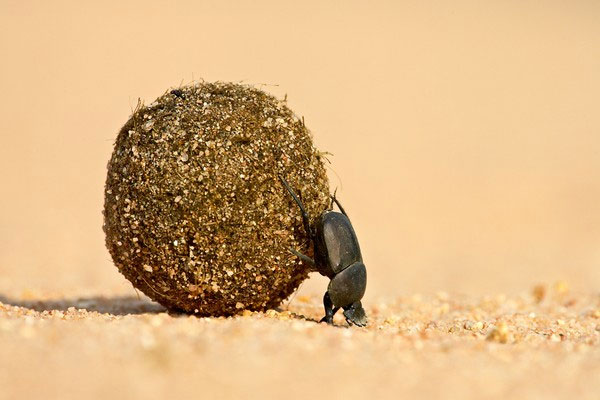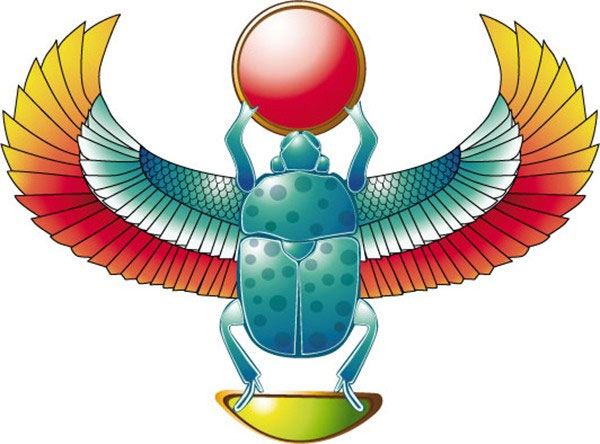The reason why the Egyptians worship the beetles eat dung
Understand more about beetles eating dung - hard-winged insects possess a special ability, worshiped by ancient Egyptians.
The beetle is famous in the animal world with a strange and slow lifestyle. They can spend the whole day rolling, turning into a circle and rolling to the nest.
Feces are also the food of this animal, so the name of the dung beetle is born. Most surprising is that the ancient Egyptians from the seventeenth century worshiped this beetle.
The dung beetle has many different shapes with separate 'functions' suitable for the living environment. Some species simply find a pile of dung and rave digging.

While others dig the entire tunnel, create a cave and path to bring feces to the nest every day. The rest roll any lump they find on the way.
The beetle uses its head and legs as a "sculpting" tool, forming feces until it has a perfectly spherical shape. After that, the beetle's hind legs will be used to roll the round stool.
This image inspired the imagination of ancient Egyptians. According to Yves Cambefort researcher, the beetles roll in the daytime, late in the evening trying to bury them and then "pull up" again to continue the journey.

This is like the god of the sun Khepri bears the human image but has the face of a beetle. He was described as a diligent god rolling a star shining through the sky, burying the star when the Sun was setting and digging in the East at dawn.
Not only that, this beetle also possesses the power of heaven. Stool beetles can be considered excellent sailors, they use the Sun as a pilot when they roll.
During this process, the beetle will stop there periodically, climb up on the stool and look around for direction and then climb down again and continue to diligently roll.

The problem with this beetle is its effectiveness . The beetles need to roll quickly to avoid the risk of being attacked. Other scarab beetles can frantically rush to fight for feces and wrestle back and forth like a real wrestler.
By using the Sun as a 'navigator' instead of a fixed land surface, they could roll in a straight line to their cave, instead of spending time on rolling around indefinitely.
However, their mobility is even more amazing. When the Sun sets, the beetles can switch to using the Moon as a 'navigator'.

So what happens without the Moon? In 2013, scientists conducted experiments on a moonless night and placed little hats on the beetle's head to reduce their eyesight.
As a result, these beetles used the galaxy to orient themselves, which is a completely unique case in the animal world. When worn, they can move in a straight line.
The beetle is a symbol of the sun god of the ancient Egyptians . However, the Egyptians misunderstood the method of giving birth of this hard-winged insect.

The male beetle 'carve' the clump into a circle in order to replace the female beetle's eggs, so they do not need children during the breeding process.
The male just needs to pump the semen into the round stool, then the larvae hatch, eat the stool around it and then pup and crawl out.
This action has turned beetles into organisms that play a key role with many ecosystems.

Especially with Africa - where there are many different species of animals and every day release a lot of feces to the point of dizziness. The beetle will process this manure by taking it little by little, round it and roll it to the nest, which helps spread evenly across the fields.
This work also takes away the flies' food sources, thus avoiding environmental pollution.
Therefore, according to scientists, this dung beetle deserves the respect of ancient Egyptians. Even the Greeks worship them as the king of the mythical little world and liken them to the God of Zeus because of the special powers hidden inside this small beetle.
- What animals did the ancient Egyptians worship?
- The face of the aggressive beetles has a frightening appearance
- 'Strange worship of aircraft' on the remote island
- Why did the ancient Egyptians worship lotus images?
- Discovering the ancient Greek worship complex in the Republic of Cyprus
- Video: 'Terrible' beetles fight territory horns
- Lessons from insect masters
- The mysterious giant beetle
- The Argentine typhoon sealed the end of the world?
- Discover 100 sexual worship places in Israel
- Mushrooms turn beetles into living corpses to lure prey
- More than 800 million trees in the US
 'Fine laughs' - Scary and painful torture in ancient times
'Fine laughs' - Scary and painful torture in ancient times The sequence of numbers 142857 of the Egyptian pyramids is known as the strangest number in the world - Why?
The sequence of numbers 142857 of the Egyptian pyramids is known as the strangest number in the world - Why? History of the iron
History of the iron What is alum?
What is alum?